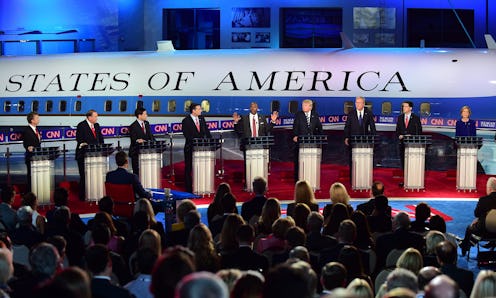News
Where You Can Watch The 3rd GOP Debate
The first two Republican primetime debates gave everyone in America plenty to talk about at the water cooler the next day, and the next debate promises to do the same. The third primetime GOP debate will take place on October 28 at the University of Colorado in Boulder, Colorado, and will likely feature a narrowed-down lineup, which could mean a more focused discussion this time around. Either way, it will be worth watching (after all, Donald Trump will still be there for entertainment value). So where will the third Republican primetime debate be broadcast? It looks like the event will be broadcast exclusively on CNBC, so those who have cable are all set, while those who don't will have to look for alternative ways to watch.
Back in July, CNBC announced that it would be hosting a GOP debate with a focus close to the network's heart. Entitled "Your Money, Your Vote: The Presidential Debate on the Economy," the debate will be centered around issues like jobs, taxes, and other issues related to the country's economy. CNBC also announced that the live event will be held at the Coors Events Center at the University of Colorado while the televised event will be broadcast on CNBC exclusively. The undercard event will start at 6 p.m., while the primetime event will start at 8 p.m., and this time it will be capped at two hours, after CNBC obliged demands from Trump and Ben Carson.
The channel has yet to announce any alternative methods of viewing, like online streaming, an audio-only component, or live blog coverage, but will likely do so closer to the event.
The biggest difference in CNBC's debate will be the lineups at both the 8 p.m. primetime event and the 6 p.m. undercard debate, both of which could see major players absent from the stage. At the end of last month, the network announced its criteria for debate candidates, which requires primetime debaters to have a minimum average of 2.5 percent in the major national polls, released between September 17 and October 21. In order to qualify for the undercard debate, candidates must have at least one percent in any of the polls.
According to this criteria, two candidates who we've seen debate in the first two primetime events, Mike Huckabee and Rand Paul, might not make the cut this time around. According to ABC, polling averages have placed Huckabee and Paul within one percent of the cutoff, while everyone else has consistently stayed above the 2.5 qualifying percentage. Meanwhile, CNBC's undercard event could exclude Lindsey Graham and Jim Gilmore, neither of whom had an average of one percent in at least one national poll, as of September 30.
